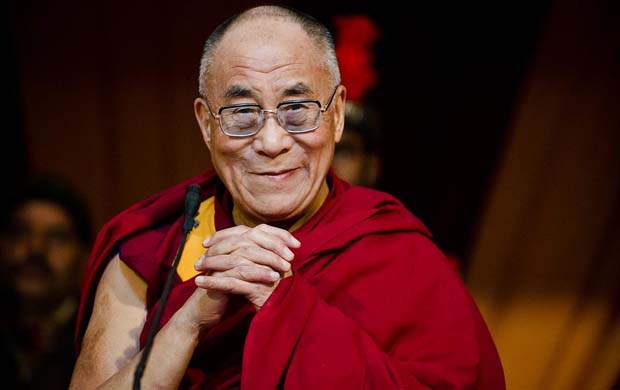Patrick Claffey
The Book of Joy
by the Dalai Lama and Desmond Tutu, edited by Douglas Abrams (Hutchinson, £12.99)
A few years ago, taking a taxi into Nassau St to teach a module at Trinity College, the Dublin driver asked me what I taught. That afternoon, I told him, I was to give a lecture on Buddhism.
“The Buddhists, they’re alright, aren’t they?’, he remarked. ‘Very hard to have a row with one of them. Sure, your man, the Dalai Lama, he’s a great fella, isn’t he? All he had to go through!”
That, I imagine, is how many people see Tenzin Gyatso (b. 1935), His Holiness, the 14th Dalai Lama, as he travels the world, with an apparently unquenchable good humour, a permanent smile, and a deep sense of equanimity even when he is being cold-shouldered by governments who fear he will compromise their relations with China.
Detachment
He refuses to be morose and certainly illustrates well the deeply Buddhist concept of nekkama, commonly translated as detachment or renunciation. “If something can be done about the situation, what need is there for dejection? And if nothing can be done about it, what use is there for being dejected?’
The Dalai Lama is without doubt one of the major religious leaders of our time. His influence has spread far beyond his own Tibetan mountain community.
Since 1959 he has lived in Dharamshala, in northern India, from where he travels widely, much to the irritation of the Chinese government for which he is a permanent, albeit non-violent, thorn in the side, preaching a very simple message of peace and joy. He was awarded the Nobel Peace Prize for 1989.
While very different in background, Desmond Tutu, former Anglican Archbishop of South Africa, was a prominent early crusader in the struggle against apartheid. During much of the time of Nelson Mandela’s long, invisible imprisonment, Tutu was the visible face of the anti-apartheid struggle.
Inevitably eclipsed by Mandela following his release and inevitable rise to power, Tutu found a new apolitical role as an apostle of national reconciliation when he was appointed Chair of the Truth and Reconciliation Commission.
Over time and through lived experience, Tutu developed a philosophy, which was essentially the opposite of apartheid, and indeed much of the heated “anti-Other rhetoric” we hear today.
This is based upon the specifically African concept of Ubuntu, meaning: “A person is a person through other persons.”
As Tutu explains it, sharing is a kind of ‘self-interest’, simply because ‘none of us came into the world on our own’ and consequently we need others to live fully. “We are meant for a profound complementarity. It’s the nature of things… we belong in this delicate network.”
This book is essentially a conversation between two old men as they reach the end of this earthly life, however they see that.
It is a conversation between friends, ‘mischievous spiritual brothers’ although they have only met half a dozen times. There is indeed something both childlike and mischievous about the conversations, and neither man would make any apology for that. Life experience has led them far beyond pomposity and false formality to the realm of the really real.
As Douglas Abrams, who drew the conversations together observes: “[They are] two spiritual masters of our time…moral leaders who transcend their own traditions and speak for humanity as a whole.”
Central to their witness is the fact that “they refuse to give in to the fashionable cynicism that risks engulfing us.”
The main theme of the book is the very opposite of cynicism, as we can see from the title The Book of Joy. Having lived lifetimes that involved much suffering both on a personal level and in their respective communities, they remind us that “that joy is our birth right”, and the birth right of all people and peoples.
The purpose of the five days of dialogue was the “very purpose of life – the goal of avoiding suffering and discovering happiness”.
It is significant to note that Pope Francis first Exhortation was Evangelii Gaudium (The Joy of the Gospel), bringing to the fore an aspect of Christian life that is often neglected. He sees the Christian life as being based on knowing and experiencing God’s love, mercy and salvation offered to all through the death and resurrection of Jesus Christ.
Source of joy
This is the source of our joy. In his ministry, even in recent difficult times, he has given witness to this joy.
In a recent homily he declared: “A Christian is a man, or a woman, of joy: a man and a woman with joy in their heart. There is no Christian without joy!”
Abrams tells us that research suggests that “three factors that seem to have the greatest influence on increasing our happiness are our ability to reframe our situation more positively, our ability to experience gratitude and our choice to be kind and generous”.
These two friends return to these as central pillars of joy, a joy that is deep and lasting, throughout this work. In their respective and very different, but complementary, lives, they have left us a great witness to this that is very well drawn together in this lovely book, which should itself bring some joy in these questioning and often dark times.



